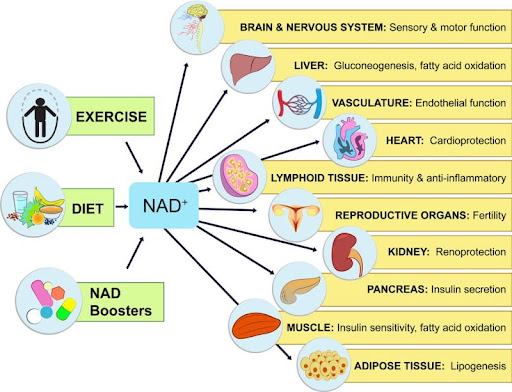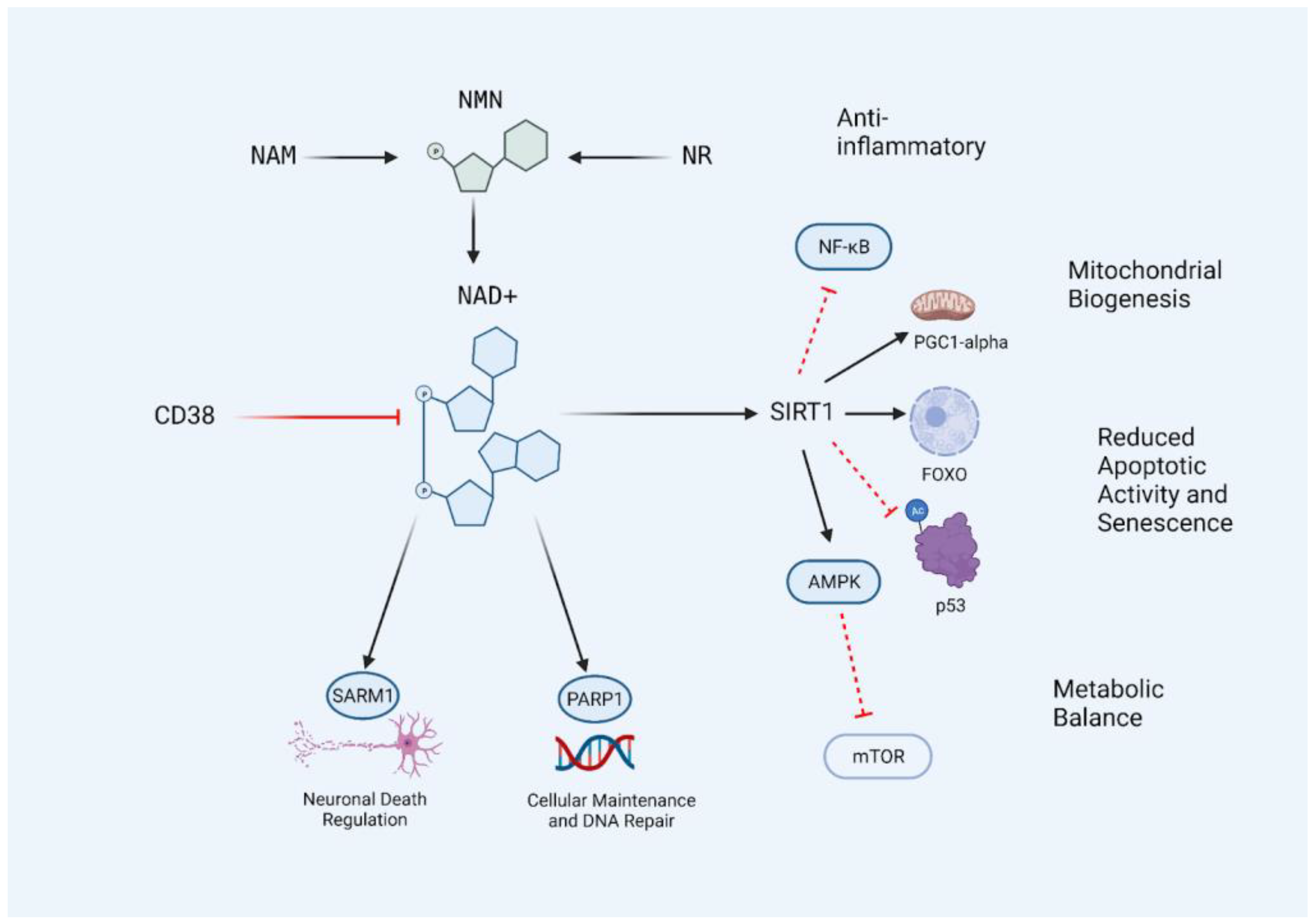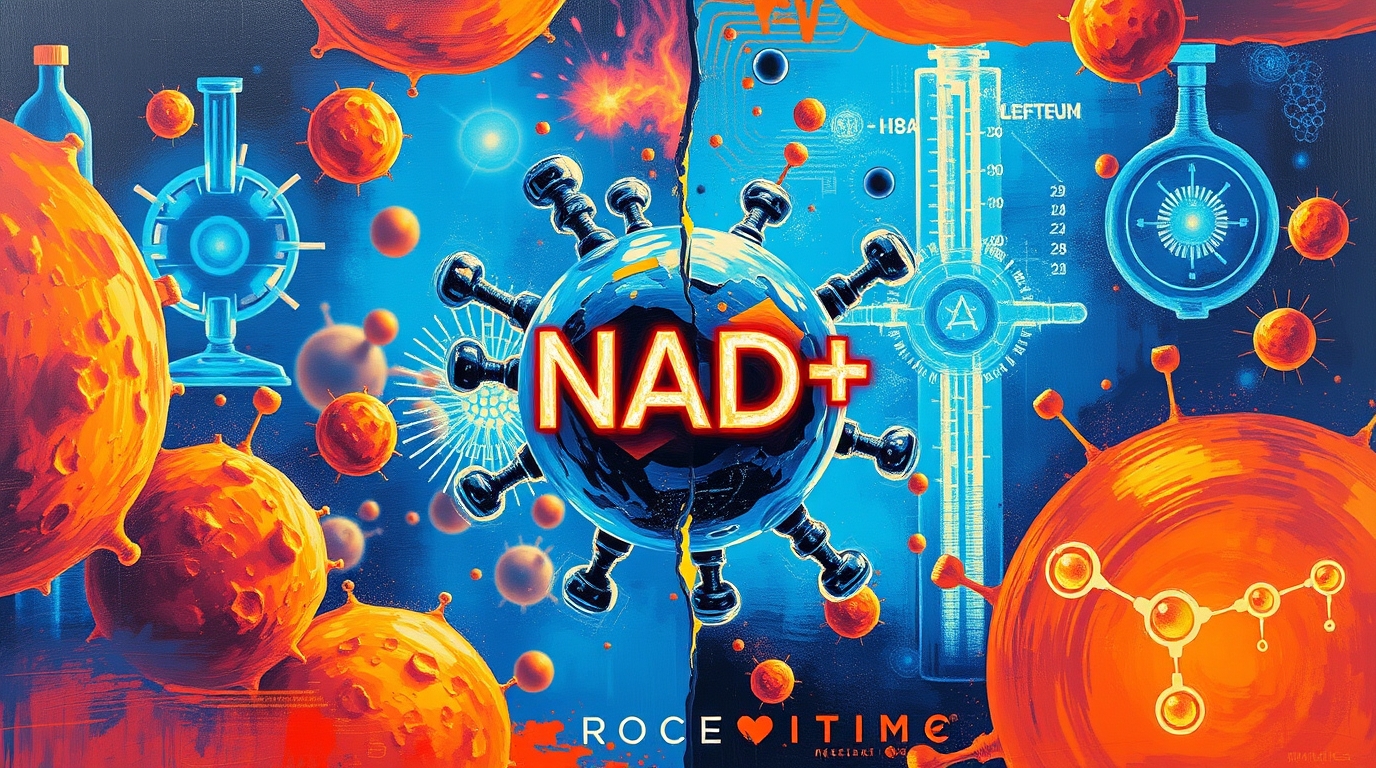Aging is a natural process, but its impact on cellular health and energy metabolism can lead to chronic conditions and diminished quality of life. Recent breakthroughs in science have highlighted the role of NAD+—a coenzyme found in all living cells—in mitigating the effects of aging. Research, such as the findings published in PubMed, underscores the promise of NAD+ boosters in restoring cellular health and promoting longevity.
Boosting NAD+ levels holds the promise of rejuvenating cellular function, protecting against age-related diseases, and extending healthspan.
Dr. David Sinclair, Professor of Genetics at Harvard Medical School and Leading NAD+ Researcher
In this blog, we’ll explore the science behind NAD+, its decline with age, and how NAD+ boosters are emerging as powerful tools in the fight against aging.
What is NAD+ and Why is it Important?
Nicotinamide adenine dinucleotide (NAD+) is a coenzyme critical to several essential cellular processes, including:

- Energy Metabolism: NAD+ facilitates the conversion of nutrients into ATP, the cell’s primary energy source.
- DNA Repair: It serves as a substrate for enzymes like PARPs (poly-ADP-ribose polymerases) that repair DNA damage.
- Cellular Defense Mechanisms: NAD+ activates sirtuins, proteins involved in stress resistance and metabolic regulation.
- Mitochondrial Health: Mitochondria rely on NAD+ to function efficiently, maintaining the energy supply required for cellular repair and regeneration.
Unfortunately, NAD+ levels naturally decline with age. By middle age, NAD+ levels may decrease by as much as 50%, contributing to reduced energy, increased inflammation, and the onset of age-related diseases.
NAD+ Boosters: The Solution to Declining Levels
To combat the decline of NAD+, scientists have developed NAD+ boosters—compounds that replenish the body’s NAD+ stores. Two of the most studied NAD+ precursors are:
- Nicotinamide Riboside (NR): A vitamin B3 derivative that converts into NAD+ through a direct metabolic pathway.
- Nicotinamide Mononucleotide (NMN): Another NAD+ precursor known for its ability to enhance NAD+ levels efficiently.
These supplements, often taken orally, aim to restore NAD+ levels and counteract the effects of aging at the cellular level.
How Do NAD+ Boosters Fight Aging?
Research suggests that NAD+ boosters have far-reaching implications for anti-aging therapies. Here’s how they work:

1. Improved Mitochondrial Function
Mitochondria, the powerhouses of cells, rely on NAD+ for optimal energy production. Age-related mitochondrial dysfunction is a hallmark of aging, leading to fatigue, muscle weakness, and cognitive decline. Boosting NAD+ levels can rejuvenate mitochondrial function, improving energy metabolism and delaying the onset of age-related disorders.
2. Enhanced DNA Repair
DNA damage accumulates over time due to environmental factors like UV radiation and oxidative stress. NAD+ is a critical component of the DNA repair process. Increased NAD+ availability through supplementation has been shown to enhance DNA repair mechanisms, reducing cellular damage associated with aging.
3. Activation of Sirtuins
Sirtuins are proteins that regulate cellular health, including stress resistance, inflammation, and metabolic function. Sirtuins require NAD+ to function, and boosting NAD+ levels can enhance their activity, promoting longevity and reducing the risk of age-related diseases.
4. Reduction in Inflammation
Chronic low-grade inflammation, often termed “inflammaging,” is a significant driver of aging. NAD+ boosters can modulate inflammatory pathways, reducing the levels of pro-inflammatory molecules and promoting tissue repair.
5. Improved Cognitive Function
Studies have shown that NAD+ boosters may protect against neurodegenerative conditions like Alzheimer’s and Parkinson’s disease. By supporting neuronal energy metabolism and reducing oxidative stress, NAD+ helps preserve cognitive function as we age.
What Does the Research Say?
The study available on PubMed provides compelling evidence for the benefits of NAD+ boosters in anti-aging therapies. Key findings include:
NAD+ is like the fuel for our cellular engines; without it, the aging process accelerates and health declines.
Dr. Charles Brenner, Biochemist and Discoverer of Nicotinamide Riboside (NR) Pathway
- Increased Healthspan: Animal studies demonstrated that NAD+ supplementation improved overall health markers, including physical endurance, cognitive performance, and metabolic health.
- Delayed Aging: NAD+ boosters slowed the progression of age-related declines in mitochondrial function and reduced oxidative stress in preclinical models.
- Protection Against Chronic Diseases: Restored NAD+ levels correlated with reduced incidence of age-related conditions, such as cardiovascular diseases and neurodegenerative disorders.
While human studies are still ongoing, early trials suggest similar benefits, paving the way for NAD+ boosters to become a cornerstone of anti-aging medicine.
How to Boost NAD+ Levels Naturally
While supplements like NR and NMN are effective, lifestyle choices also play a crucial role in maintaining NAD+ levels:
- Regular Exercise: Physical activity stimulates the production of NAD+ and enhances mitochondrial efficiency.
- Healthy Diet: Consuming NAD+ precursors found in foods like milk, fish, and green vegetables supports natural NAD+ production.
- Intermittent Fasting: Caloric restriction and fasting have been shown to boost NAD+ levels and activate sirtuins.
- Adequate Sleep: Quality sleep is essential for NAD+ biosynthesis and cellular repair.
Combining these habits with NAD+ supplementation can amplify the benefits and promote long-term health.
Potential Challenges and Risks
While NAD+ boosters are generally considered safe, there are a few considerations:

- Cost: High-quality NAD+ supplements can be expensive, limiting accessibility.
- Long-Term Safety: More research is needed to fully understand the long-term effects of sustained NAD+ supplementation.
- Individual Variability: Responses to NAD+ boosters may vary depending on genetics, age, and lifestyle factors.
Future Directions for NAD+ Research
The field of NAD+ research is rapidly evolving. Here are some exciting areas of exploration:
- Combination Therapies: Integrating NAD+ boosters with other anti-aging interventions, such as senolytics or telomere lengthening, for synergistic effects.
- Targeted Delivery Systems: Developing advanced formulations that deliver NAD+ directly to specific tissues or organs.
- Disease-Specific Applications: Investigating how NAD+ boosters can be tailored to treat specific conditions, such as metabolic disorders or autoimmune diseases.
Final Thought: A New Frontier in Anti-Aging
NAD+ boosters represent a groundbreaking advancement in our quest to combat aging. By replenishing the body’s NAD+ stores, these supplements address the root causes of cellular decline, offering a path toward healthier aging and improved quality of life.
As highlighted by the study on PubMed, the potential of NAD+ boosters extends beyond simply extending lifespan—it’s about enhancing healthspan, allowing individuals to live longer, more vibrant lives.
While more research is needed to fully understand their long-term effects, the evidence so far points to NAD+ boosters as a promising tool in the fight against aging. As always, consult a healthcare professional before starting any new supplement regimen.
The future of anti-aging science is here, and NAD+ boosters are leading the charge toward a healthier tomorrow.
Recent Insights into the Role of NAD+ Boosters in Anti-Aging
“NAD+ Boosters Enhance Mitochondrial Function and Delay Aging”
A study published in Cell Metabolism found that NAD+ precursors like nicotinamide riboside (NR) improved mitochondrial efficiency in aging mice. This resulted in increased energy production, reduced oxidative stress, and delayed the onset of age-related diseases.
Read the full study here.
“NAD+ Supplementation Improves DNA Repair and Extends Lifespan”
Research demonstrated that NAD+ boosters activated enzymes involved in DNA repair, reducing cellular damage caused by aging. In preclinical models, this led to extended lifespan and improved overall health markers.
Explore the findings here.
“Sirtuin Activation Through NAD+ Boosters Promotes Longevity”
A study highlighted the role of sirtuins—NAD+-dependent proteins—in regulating cellular stress and metabolic pathways. NAD+ boosters increased sirtuin activity, leading to enhanced stress resistance and longevity in animal models.
Discover more here.
“NAD+ Precursors Protect Against Neurodegenerative Diseases”
Recent research found that NAD+ supplementation protected against cognitive decline in Alzheimer’s disease models. By supporting neuronal energy metabolism and reducing oxidative damage, NAD+ boosters preserved cognitive function.
Learn more about this study.
“Combining NAD+ Boosters with Caloric Restriction Enhances Healthspan”
A 2023 study revealed that combining NAD+ supplementation with caloric restriction amplified the benefits of both interventions. The dual approach improved metabolic health, reduced inflammation, and extended healthspan in aging subjects.
Read the insights here.
These findings highlight the transformative potential of NAD+ boosters in combating aging by improving mitochondrial function, enhancing DNA repair, and reducing inflammation. While ongoing research aims to validate these results in humans, NAD+ supplementation is emerging as a promising tool for promoting healthy aging. Always consult a healthcare professional before starting any supplement regimen.

























